Three Things is a new occasional series where I’m planning to write about – gasp! – things that aren’t actually books. It’s based on a blog I’m a big fan of right now, 27 Good Things, where interesting people share three things to read, watch and use. I’m hoping it’ll be another way of sharing the stuff that currently has my attention.
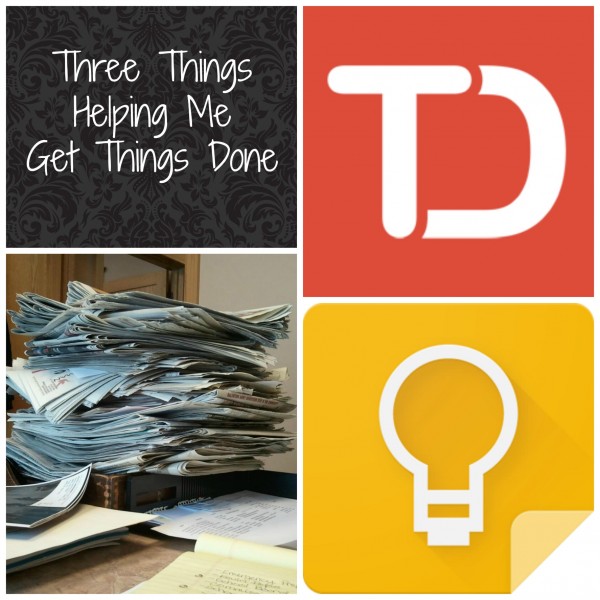
Today is an exciting day for productivity nerds — an updated version of David Allen’s productivity tome Getting Things Done is out today! I read this book for the first time last year and while I haven’t implemented the whole GTD system, parts of it have really helped me feel like I am more on top of all the things I need to keep track of. In honor of the book’s release, I decided today’s Three Things post would focus on things that help me get stuff done.
As an aside, it’s a little ironic that this post is going up today, since I spent the last two day sitting on my couch watching Netflix/Hulu (no joke, I’m too embarrassed to even tell you how many hours of Parks and Recreation and Empire I went through). During my non-sloth weeks, I’m actually pretty efficient… this is not one of them. Good thing I have a new copy of Getting Things Done on the way. Anyway, on to my three things!
[continue reading…]
{ }
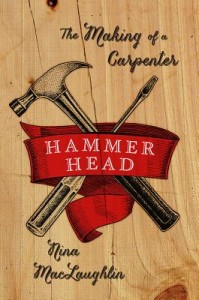 In her twenties, Nina MacLaughlin spent most of her time sitting behind a desk at a newspaper in Boston. Tired of moderating comments and feeding the endless beast that is the Internet (sound familiar?), MacLaughlin responded to a Craiglist ad looking for a carpenter’s assistant – “women strongly encouraged to apply.” Despite her lack of experience, MacLaughlin got the job and began her apprenticeship as a carpenter – a career change she chronicles in her memoir Hammer Head (March 16 from W.W. Norton).
In her twenties, Nina MacLaughlin spent most of her time sitting behind a desk at a newspaper in Boston. Tired of moderating comments and feeding the endless beast that is the Internet (sound familiar?), MacLaughlin responded to a Craiglist ad looking for a carpenter’s assistant – “women strongly encouraged to apply.” Despite her lack of experience, MacLaughlin got the job and began her apprenticeship as a carpenter – a career change she chronicles in her memoir Hammer Head (March 16 from W.W. Norton).
I wish that I had lots of smart, interesting things to say about this book that would make you pick it up – it’s pretty great – but all of my notes are just passages I flagged with hearts or exclamation points. Although this is a memoir about what it takes to become a carpenter, it’s also a thoughtful meditation on work and the value that labor, of all kinds, brings into our lives.
So instead of a traditional review, I’m just going to share three of my favorite passages and hope that the lovely and smart writing will convince you to pick it up.
[continue reading…]
{ }
This post originally appeared on Book Riot. IRL is a twice monthly feature where I pair popular fiction with some great nonfiction. You can see all of my writing at Book Riot by following this link.
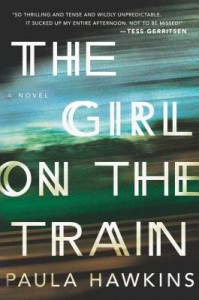 The Girl on the Train by Paula Hawkins is a twisty thriller narrated by three different struggling, unreliable women. Our main character, Rachel, is an alcoholic who rides the train every morning, catching glimpses of the lives of a couple along her route. One day, the woman, Megan, disappears and Rachel feels like she needs to do something. Complicating her quest is the presence of Anna, the woman who helped send Rachel’s life spinning out of control.
The Girl on the Train by Paula Hawkins is a twisty thriller narrated by three different struggling, unreliable women. Our main character, Rachel, is an alcoholic who rides the train every morning, catching glimpses of the lives of a couple along her route. One day, the woman, Megan, disappears and Rachel feels like she needs to do something. Complicating her quest is the presence of Anna, the woman who helped send Rachel’s life spinning out of control.
It’s a page-turning read, and a perfect jumping off point for some great books that explore ideas of both madness and forgiveness in this installment of nonfiction recommendations. Because this post assumes you’ve read The Girl on the Train – or don’t plan to read it at all – there are some small spoilers ahead. Spoiler-phobes, beware!
One of the best and most complicated things about The Girl on the Train is that our main character, Rachel, spends so much of the novel not being able to trust her own mind. The fact that she is an alcoholic, prone to periods of blackout drunkenness, means her perceptions and memories for many important events are warped or nonexistent.
[continue reading…]
{ }
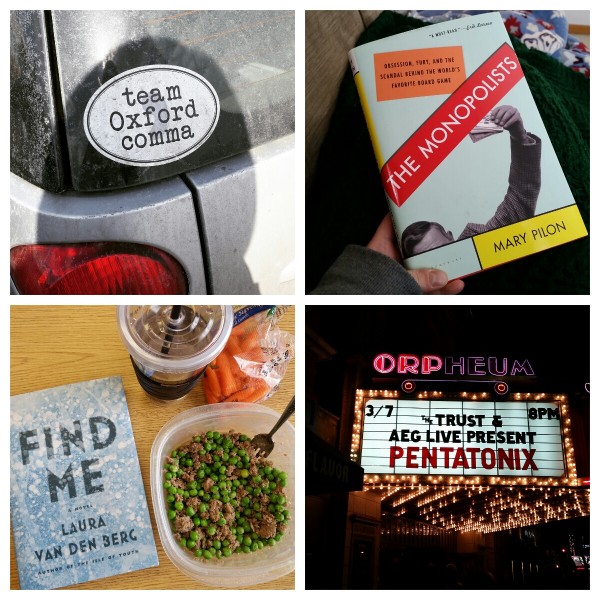
Time and Place | I think it’s about 9 a.m.? I know that I’m on my sister’s couch in Minneapolis. Daylight Saving Time always messes with me a little bit.
Reading | This week I finished The Monopolists by Mary Pilon. This narrative history of the board game Monopoly was perfectly in my wheelhouse of readable, quirky nonfiction. At the moment, I’m in the middle of How to Be Black by Baratunde Thurston, a mix of memoir and humorous essays about ideas of blackness and how they’re being challenged. I also started Laura van den Berg’s new novel, Find Me, which has some dystopian similarities with Station Eleven by Emily St. John Mandel.
Watching | The boyfriend and I watched the first couple of episodes of FOX’s new show The Last Man on Earth, which we liked a lot. We both laughed out loud at many jokes and visual gags — a good sign for a new show.
Listening | I fell hard for a couple of playlists this week: Spotify’s Acoustic Concentration (perfect for writing or blogging) and Greatist’s Ultimate Cooking Playlist. I didn’t know I wanted a specific playlist for cooking until I put this one on and it was perfect.
[continue reading…]
{ }
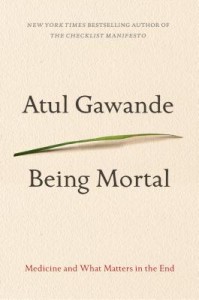 Earlier this week, a friend and I went to see Still Alice, a movie about a 50 year old linguistic professor diagnosed with early onset Alzheimer’s Disease. Alice, played by Julianne Moore, tries to manage her disease as long as she can, but eventually can’t be left alone. In one of many heartbreaking scenes, her husband and children sit at the kitchen table, trying to decide who can care for Alice while Alice sits almost unknowingly on the couch, unable to make decisions for herself any longer or even understand the decisions her family was trying to make.
Earlier this week, a friend and I went to see Still Alice, a movie about a 50 year old linguistic professor diagnosed with early onset Alzheimer’s Disease. Alice, played by Julianne Moore, tries to manage her disease as long as she can, but eventually can’t be left alone. In one of many heartbreaking scenes, her husband and children sit at the kitchen table, trying to decide who can care for Alice while Alice sits almost unknowingly on the couch, unable to make decisions for herself any longer or even understand the decisions her family was trying to make.
As I sat, crying, for most of the end of this movie, I couldn’t help but think about some of the issues that Atul Gawande brought up in his most recent book, Being Mortal: Medicine and What Matters in the End, which I’d just finished reading.
Talking about death or debilitating illness is one of the most difficult conversations to have, but it may be one of the most important. In Being Mortal Gawande explores this challenging topic, looking at our modern experience of mortality and how modern medicine can and cannot address this time in our lives (emphasis mine):
You don’t have to spend much time with the elderly or those with terminal illness to see how often medicine failed the people it is supposed to help. The waning days of our lives are given over to treatments that addle our brains and sap our bodies for a sliver’s chance of benefit. They are spent in institutions – nursing homes and intensive care units – where regimented, anonymous routines cut us off from all the things that matter to us in life. Our reluctance to honestly examine the experience of aging and dying has increased the harm we inflict on people and denied them the basic comforts they most need. Lacking a coherent view of how people might live successfully all the way to their very end, we have allowed our fates to be controlled by the imperatives of medicine, technology and strangers.
[continue reading…]
{ }


 In her twenties, Nina MacLaughlin spent most of her time sitting behind a desk at a newspaper in Boston. Tired of moderating comments and feeding the endless beast that is the Internet (sound familiar?), MacLaughlin responded to a Craiglist ad looking for a carpenter’s assistant – “women strongly encouraged to apply.” Despite her lack of experience, MacLaughlin got the job and began her apprenticeship as a carpenter – a career change she chronicles in her memoir
In her twenties, Nina MacLaughlin spent most of her time sitting behind a desk at a newspaper in Boston. Tired of moderating comments and feeding the endless beast that is the Internet (sound familiar?), MacLaughlin responded to a Craiglist ad looking for a carpenter’s assistant – “women strongly encouraged to apply.” Despite her lack of experience, MacLaughlin got the job and began her apprenticeship as a carpenter – a career change she chronicles in her memoir  The Girl on the Train
The Girl on the Train
 Earlier this week, a friend and I went to see
Earlier this week, a friend and I went to see